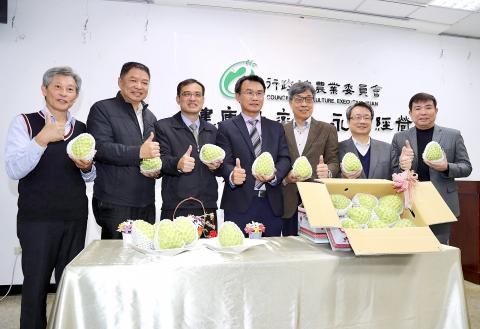More than NT$5 billion (US$166.21 million) in loans has been allocated for the agriculture, animal husbandry and recreational agriculture sectors as the 2019 novel coronavirus outbreak in China weighs on exports, the Council of Agriculture (COA) said yesterday.
Produce, livestock and aquaculture farms, as well as farmers’ associations, export companies and other agriculture-based enterprises, are eligible to apply for the loans, COA Minister Chen Chi-chung (陳吉仲) told a news conference in Taipei.
The allocation of NT$5.03 billion might increase if agricultural losses continue due to the outbreak, Chen said, adding that the loans have a preferential interest rate of between 0.79 percent and 1.68 percent.

Photo: CNA
Applicants can opt for extended loan periods, as well as interest-only loans of two to three years, the council’s Department of Planning said.
Through government subsidies, recreational agriculture enterprises and fisheries are eligible for interest-free loans of six months with an interest rate of 1.29 percent, the department said.
The recreational agriculture industry has experienced a 20 to 30 percent decline in revenue since the Lunar New Year holiday, it added.
Industries affected by the outbreak are to be offered professional training programs on broadening their market appeal by holding themed events, installing electronic ticketing and expanding their client base, the department said.
The council would assist efforts by enterprises to expand into markets outside of China, Chen said.
A subsidy of NT$6 per kilogram is being offered by the council on exports — by sea or air — of custard apples to China, he added.
The council is offering a subsidy of NT$40 per kilogram on transport fees for exports of grouper or East Asian four-finger threadfin to Malaysia, Singapore and Japan, Chen said, adding that exports to the US and Australia would receive a subsidy of NT$50 per kilogram.
The council is in talks with markets and other groups to ensure that farmers would not have losses during the first week of school, scheduled to start on Feb. 25, Chen said, adding that consumption that week is expected to total 1,750 tonnes of produce, including 120 tonnes of eco-friendly produce.
This amount is being set aside for distribution centers that service schools because of a shorter harvest time and sales difficulties, the department said.
Stores, hypermarkets and military units in Taipei, New Taipei City, Taichung, Kaohsiung and Pingtung County could purchase the remaining produce, the department said.
Food banks and other charities would be provided eco-friendly produce based on supply available, it said.
The council said that it is also encouraging buyers to use online platforms, adding that this change could boost gross agricultural revenue by NT$1 billion or more nationwide.
The council said it is focusing on stabilizing agricultural prices.

A preclearance service to facilitate entry for people traveling to select airports in Japan would be available from Thursday next week to Feb. 25 at Taiwan Taoyuan International Airport, Taoyuan International Airport Corp (TIAC) said on Tuesday. The service was first made available to Taiwanese travelers throughout the winter vacation of 2024 and during the Lunar New Year holiday. In addition to flights to the Japanese cities of Hakodate, Asahikawa, Akita, Sendai, Niigata, Okayama, Takamatsu, Kumamoto and Kagoshima, the service would be available to travelers to Kobe and Oita. The service can be accessed by passengers of 15 flight routes operated by

Alain Robert, known as the "French Spider-Man," praised Alex Honnold as exceptionally well-prepared after the US climber completed a free solo ascent of Taipei 101 yesterday. Robert said Honnold's ascent of the 508m-tall skyscraper in just more than one-and-a-half hours without using safety ropes or equipment was a remarkable achievement. "This is my life," he said in an interview conducted in French, adding that he liked the feeling of being "on the edge of danger." The 63-year-old Frenchman climbed Taipei 101 using ropes in December 2004, taking about four hours to reach the top. On a one-to-10 scale of difficulty, Robert said Taipei 101

Taiwanese and US defense groups are collaborating to introduce deployable, semi-autonomous manufacturing systems for drones and components in a boost to the nation’s supply chain resilience. Taiwan’s G-Tech Optroelectronics Corp subsidiary GTOC and the US’ Aerkomm Inc on Friday announced an agreement with fellow US-based Firestorm Lab to adopt the latter’s xCell, a technology featuring 3D printers fitted in 6.1m container units. The systems enable aerial platforms and parts to be produced in high volumes from dispersed nodes capable of rapid redeployment, to minimize the risk of enemy strikes and to meet field requirements, they said. Firestorm chief technology officer Ian Muceus said

MORE FALL: An investigation into one of Xi’s key cronies, part of a broader ‘anti-corruption’ drive, indicates that he might have a deep distrust in the military, an expert said China’s latest military purge underscores systemic risks in its shift from collective leadership to sole rule under Chinese President Xi Jinping (習近平), and could disrupt its chain of command and military capabilities, a national security official said yesterday. If decisionmaking within the Chinese Communist Party has become “irrational” under one-man rule, the Taiwan Strait and the regional situation must be approached with extreme caution, given unforeseen risks, they added. The anonymous official made the remarks as China’s Central Military Commission Vice Chairman Zhang Youxia (張又俠) and Joint Staff Department Chief of Staff Liu Zhenli (劉振立) were reportedly being investigated for suspected “serious